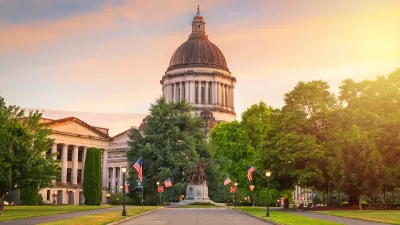A Vox explainer describes the complex political, economic, and cultural obstacles to overcome in achieving a carbon tax equal to the social cost of carbon.

"A consensus has formed among economists, climate wonks, and progressives that a carbon tax is the best way to address climate change," according to an article by David Roberts, adding, "In some quarters, rhetorical support for a carbon tax is seen as a litmus test for whether policymakers are serious about climate change."
Roberts has actually produced back to back articles on the subject of a carbon tax. The first, published on Earth Day, questioned the idea that the carbon tax is the "first best" carbon policy. In the follow-up post, Roberts instead assumes "that a carbon tax, equal to the social cost of carbon, is the ideal climate policy." The question Roberts seeks to answer then: If a carbon tax is the most efficient and effective mechanism for addressing climate change, how should the policy's apologists go about enacting a new regulatory system?
Roberts begins by noting that carbon tax proponents have yet to play the game of politics, thus commencing what he describes as "a better, more grounded conversation about what's possible for carbon pricing."
FULL STORY: The political hurdles facing a carbon tax — and how to overcome them

Planetizen Federal Action Tracker
A weekly monitor of how Trump’s orders and actions are impacting planners and planning in America.

Maui's Vacation Rental Debate Turns Ugly
Verbal attacks, misinformation campaigns and fistfights plague a high-stakes debate to convert thousands of vacation rentals into long-term housing.

Restaurant Patios Were a Pandemic Win — Why Were They so Hard to Keep?
Social distancing requirements and changes in travel patterns prompted cities to pilot new uses for street and sidewalk space. Then it got complicated.

In California Battle of Housing vs. Environment, Housing Just Won
A new state law significantly limits the power of CEQA, an environmental review law that served as a powerful tool for blocking new development.

Boulder Eliminates Parking Minimums Citywide
Officials estimate the cost of building a single underground parking space at up to $100,000.

Orange County, Florida Adopts Largest US “Sprawl Repair” Code
The ‘Orange Code’ seeks to rectify decades of sprawl-inducing, car-oriented development.
Urban Design for Planners 1: Software Tools
This six-course series explores essential urban design concepts using open source software and equips planners with the tools they need to participate fully in the urban design process.
Planning for Universal Design
Learn the tools for implementing Universal Design in planning regulations.
Heyer Gruel & Associates PA
JM Goldson LLC
Custer County Colorado
City of Camden Redevelopment Agency
City of Astoria
Transportation Research & Education Center (TREC) at Portland State University
Jefferson Parish Government
Camden Redevelopment Agency
City of Claremont





























